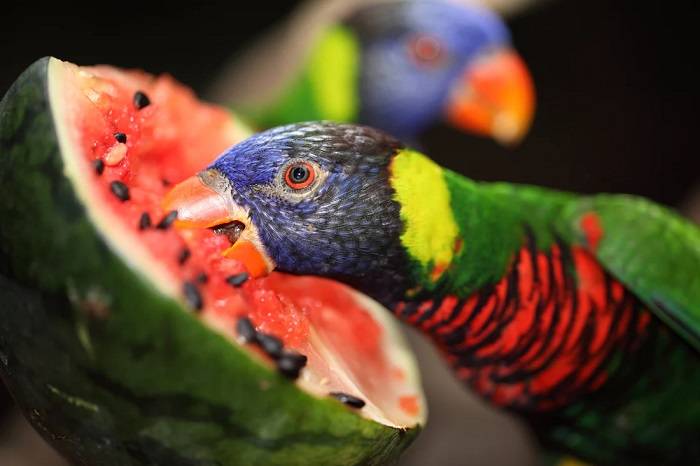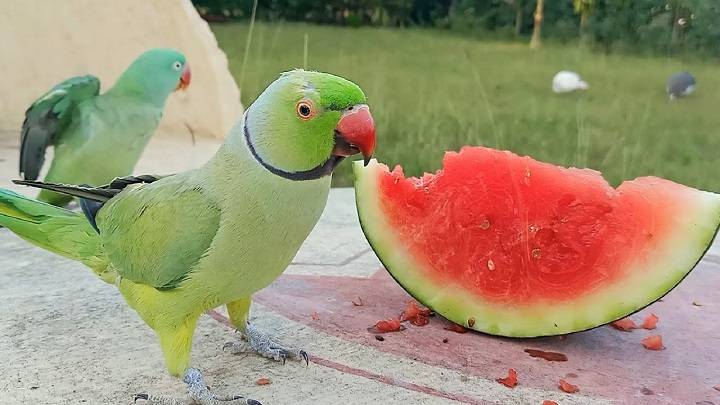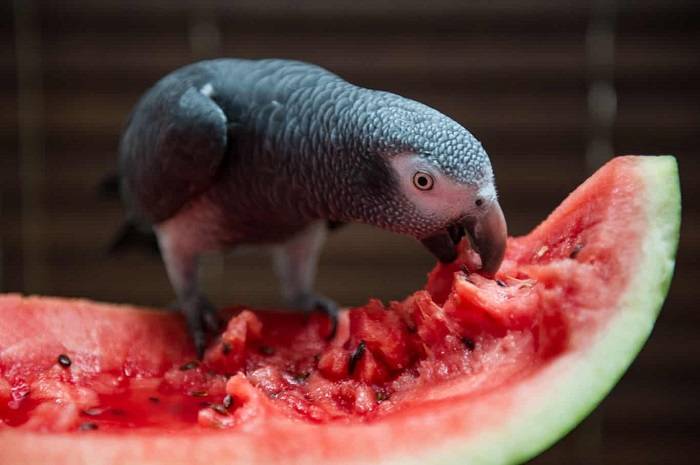As summer approaches and temperatures rise, many of us seek refreshing treats to beat the heat. Watermelon, with its juicy sweetness and high water content, is a popular choice for humans looking to stay cool and hydrated. But what about our feathered friends? Can birds enjoy this summertime delight? In this blog post, we’ll delve into the world of avian nutrition to explore whether birds can safely consume watermelon, examining the potential benefits and risks associated with feeding this fruit to our avian companions.
The Appeal of Watermelon for Birds

Hydration Boost:
- Like humans, birds require adequate hydration to maintain their health and well-being, especially during hot weather. Watermelon, with its high water content (over 90%), can help birds stay hydrated and prevent dehydration, particularly in arid or drought-prone environments.
Nutritional Value:
- While watermelon is primarily composed of water, it also contains essential vitamins, minerals, and antioxidants that can benefit birds’ overall health. These include vitamin C, vitamin A, potassium, and lycopene, which contribute to immune function, vision, and cell protection.
Potential Benefits of Feeding Watermelon to Birds
Source of Hydration:
- The juicy flesh of watermelon provides birds with a refreshing and hydrating treat, especially during hot summer days when water sources may be scarce. Offering watermelon can help birds replenish fluids lost through perspiration and respiration.
Vitamin Boost:
- Watermelon contains vitamin C, which is essential for birds’ immune systems and helps protect against diseases and infections. Additionally, the presence of vitamin A in watermelon promotes healthy vision and reproductive function in birds.
Risks and Considerations
Seed Hazard:
- While the flesh of watermelon is generally safe for birds to consume, the seeds pose a potential choking hazard, particularly for smaller bird species. It’s essential to remove seeds from watermelon slices before offering them to birds to prevent accidental ingestion.
Sugar Content:
- Watermelon is naturally sweet due to its sugar content, primarily in the form of fructose. While birds can metabolize small amounts of sugar, excessive consumption may lead to weight gain, diabetes, or digestive issues. It’s crucial to offer watermelon as an occasional treat in moderation.
Feeding Guidelines and Best Practices
Seed Removal:
- Before offering watermelon to birds, carefully remove all seeds to eliminate the risk of choking or gastrointestinal blockages. Alternatively, you can offer seedless watermelon varieties to birds to ensure their safety.
Portion Control:
- Offer watermelon to birds in small, bite-sized pieces to prevent overconsumption and reduce the risk of digestive upset. Monitor birds’ intake and observe their response to watermelon treats to gauge their tolerance and preferences.
Can Birds Enjoy Watermelon
Parrots and Parakeets:
- Many parrot species, including budgerigars and cockatiels, enjoy the occasional watermelon treat. Offer small pieces of seedless watermelon as a refreshing snack, but avoid feeding large quantities due to the fruit’s high sugar content.
Songbirds and Thrushes:
- Some songbirds, such as robins and thrushes, may also sample watermelon if offered. However, these species primarily rely on insects, fruits, and seeds as their main dietary staples, so watermelon should be offered sparingly as an occasional treat.
Related Post:
The Essential Guide to Pet Ducks: Care, Behavior, and Joys of Keeping Ducks
Discovering the Distinctive Charm of Aylesbury Ducks: A Classic Duck Breed
Cracking the Cayuga Duck Egg Mystery: Unveiling the Secrets of Cayuga Duck Eggs
Watermelon can be a refreshing and nutritious treat for birds when offered in moderation and with appropriate precautions. While the fruit provides hydration and essential vitamins, such as vitamin C and vitamin A, it’s essential to remove seeds and limit sugar intake to prevent potential health issues. By incorporating watermelon into birds’ diets responsibly, we can provide them with a tasty and hydrating snack while promoting their overall health and well-being.



